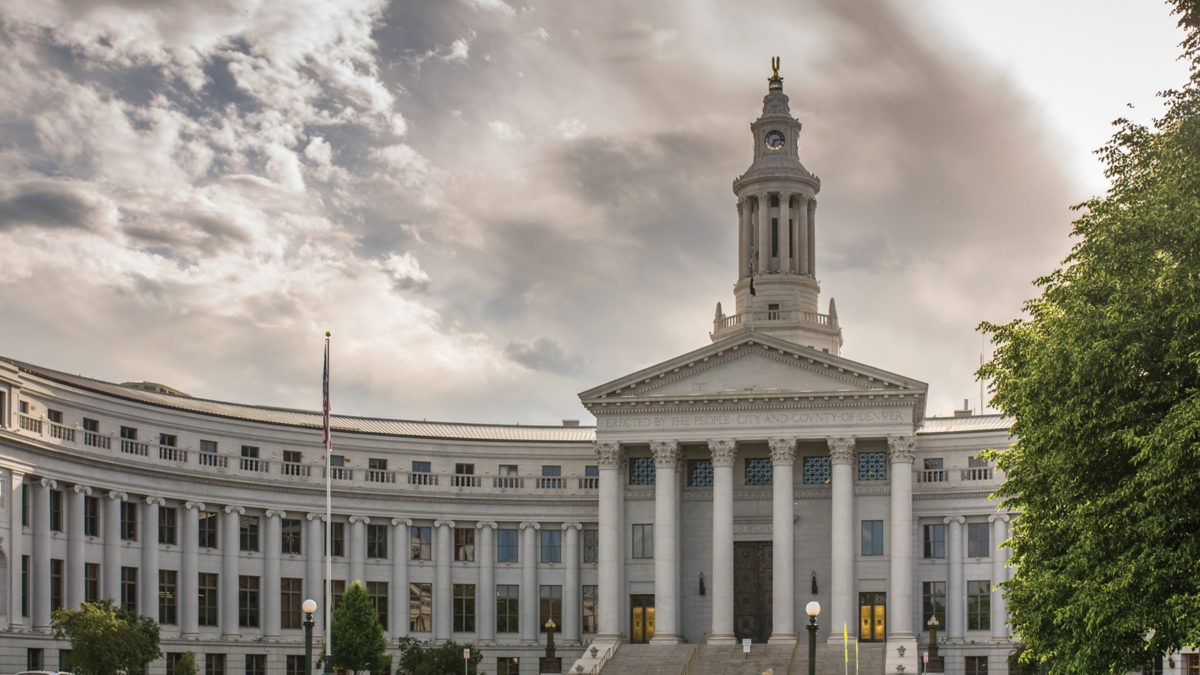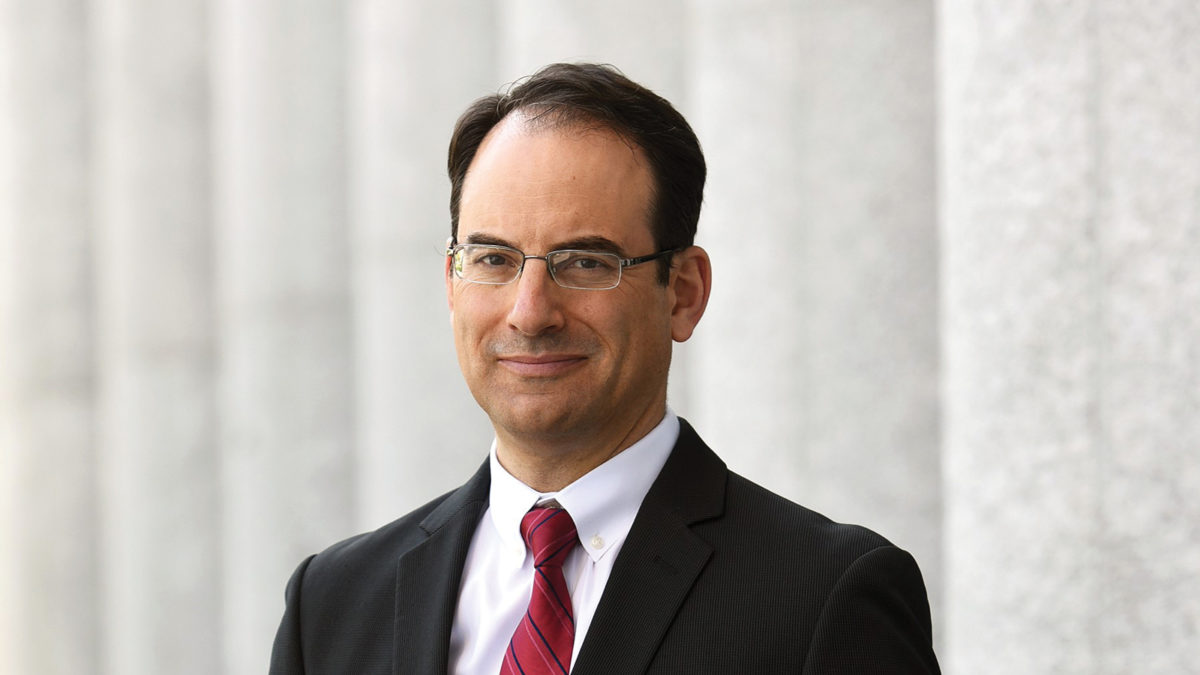
Leading with Empathy
A Message from Our Attorney General
February 2021
Download This Article (.pdf)
If you’ve read any of my previous President’s Messages or have heard me speak in my capacity as CBA president, you probably know that (1) the theme for my presidential term is Lawyers as Leaders, and (2) Attorney General Phil Weiser is the inspiration. As Colorado’s 39th Attorney General, AG Weiser is not just a leading lawyer. He’s the leading lawyer in our state. And in my view, we are very fortunate to have him in this role.
Serving as our Attorney General is a big job, and of course AG Weiser is very busy. Nevertheless, in his “spare time,” he is and has been a mentor to hundreds (perhaps thousands) of other lawyers in Colorado. He has helped lawyers and law students connect with other attorneys, pursue their passions, advance their professional goals, and secure employment opportunities. As head of the largest law department in Colorado, he has hired many of these lawyers and law students himself. He surrounds himself with the best people—mostly lawyers but also his physician wife of almost 20 years, Heidi Wald. With his high ideals, natural optimism, endless energy, and genuine interest in and meaningful relationships with others, AG Weiser draws people in. And when he asks them to work with him or collaborate on some project, it is almost impossible to say no.
Maybe that is partly because AG Weiser never seems to say no. He is always willing to collaborate. I have found that to be the case since I first met him when he was dean of the University of Colorado School of Law (CU Law), a role he served in from 2011 to 2016. During those years, I was on the CBA’s Committee for Balanced Legal Careers (CBLC) and also the board of the Colorado Women’s Bar Association (CWBA), ultimately serving as CWBA president. Dean Weiser worked with me on a number of programs relating to equity, diversity, and inclusivity, including a CBLC program on work/life flexibility, a dean’s leadership luncheon and first-year orientation discussion at CU Law on gender diversity and leadership, a CWBA program on the “confidence gap” between men and women, another on alternative metrics for evaluating attorneys, and—after becoming AG in 2018—a program with Gibson Dunn, diversity bar associations, both local law schools, and the Institute for the Advancement of the American Legal System (IAALS) on what different legal employers look for in new attorneys.
In addition, AG Weiser encouraged and supported my application for CBA president, brainstormed with me in a meeting at his office while I was president-elect, and has accompanied me on two of my presidential visits to local bar associations, where he spoke on panels along with District Attorney Beth McCann, Senator Pete Lee, and former legislator Cole Wist on the topic of alternative careers for lawyers as leaders in government.
All this collaboration over many years has led me to view AG Weiser as a “leadership mentor,” meaning someone who helps and inspires me to be willing to step up and lead—to give back to others and our profession. After all, AG Weiser has been giving back his entire career. As mentioned, before becoming AG, he served as a professor of law and dean of CU Law, where he founded the Silicon Flatirons Center for Law, Technology, and Entrepreneurship. He also served in senior leadership positions in the Obama Administration and was appointed to serve as a deputy assistant AG in the US Department of Justice and as senior advisor for technology and innovation at the White House’s National Economic Council. Earlier in his career, AG Weiser co-chaired the Colorado Innovation Council and served in President Bill Clinton’s Department of Justice. After graduating from law school, he clerked in Denver for Judge David Ebel on the Tenth Circuit Court of Appeals and then held two clerkships at the US Supreme Court, for Justices Byron White and Ruth Bader Ginsburg.
AG Weiser continues to be inspired by former Justice Ginsburg’s example.1 As he wrote in tribute to Justice Ginsburg, citing the well-known example of her relationship with former Justice Antonin Scalia, “Justice Ginsburg was a model in how to befriend and engage those who might not always agree with each other.”2 AG Weiser is a model for how to do this as well. He has been described as “both very progressive and also very pragmatic.”3 He works “with attorneys general of both parties” to “advance solutions.”4 He is a “big advocate of an open door for affected parties to share their perspectives.”5 He has even been criticized by some, but lauded by others, for “his willingness to bring industry to the table.”6 But perhaps Katie Reilly of Wheeler Trigg O’Donnell said it best: “AG Weiser is brilliant at amplifying each of the voices around him and weaving together very different ideas to build creative, consensus-based solutions to difficult challenges.”
AG Weiser sees “[t]he current level of polarization and the demonization of other points of view as a threat to our country’s—and Colorado’s—future.”7 As a result, he makes the case for empathetic leadership—and I was so grateful to him for sharing this message at the CBA Board of Governors in December. His remarks were exactly what we needed to hear as we wound down a divisive 2020. I am reprinting them here as a reminder of why we must strive to follow a better and more unified path in 2021.
Please enjoy.
Leading with Empathy, AG Weiser’s Talk with the CBA, December 11, 2020
It is an honor to join you today and to offer my perspective on how we in Colorado can elevate the role of the legal profession and the role of lawyers in our society. In my talk today, I will focus on the importance of lawyers as empathetic leaders and why it matters to the future of both our profession and our democratic republic. As I see it, Colorado, and indeed the nation, need empathetic leadership in this moment in our history as much as any time in our history.
In the 21st century, both for the practice of law and the role of lawyers as leaders, I believe the most important competency for lawyers is empathy. Let me begin by contrasting empathy with sympathy. Sympathy means you understand that someone is suffering and want to help them. This involves a more distant or abstracted experience with, at best, an intellectual connection. Empathy means you are touched by and feel what another person feels, creating an emotional connection that can build a trusted relationship.
For lawyers, the relationship with clients may involve a purely intellectual connection or it may also involve an emotional one. The ability to create an emotional connection—fueled by empathy and authentic listening—is powerful. This draws on a great lesson that master teachers know well—“no one cares how much you know until they know how much you care.” And if people don’t believe you care about them, few other values may matter to a client—including an attorney’s intellect or mastery of the law.
The best lawyers are those who earn the confidence of their clients, demonstrating genuine concern for them and demonstrating how they care about solving their problems. This could include a small business struggling during the pandemic, a criminal defendant facing a life-altering situation, or a major corporation facing challenging litigation. Great lawyers also develop empathy for our colleagues, lawyers and legal professionals alike, many of whom are suffering during this pandemic.
One important role of empathy is for opposing counsel because the bar—at its best—fosters a level of professionalism that allows for collaborative problem solving and collegiality between lawyers. To be sure, it can be very challenging when lawyers are expected to be forceful advocates for their clients in litigation or in transactions. But by being empathetic to the other side, we can open up more creative solutions to legal problems that we wouldn’t have seen if we only see things from our own client’s perspective. Fortunately, in Colorado, we operate in a small legal community where there is a good chance you will come up against opposing counsel again, you are somehow connected to your opposing counsel, or you just know that there is a significant risk that any bad behavior will come back to bite you. Unfortunately, law schools—and I say this as a former law school dean and the leader of the largest law firm in Colorado—rarely seek to develop emotional intelligence, including empathy, meaning that law schools are generally undervaluing this critical competency.
To transform legal education and reimagine the training of lawyers, developing empathy should be placed front and center. Traditional law school classes generally present abstract fact patterns and elevate the importance of issue spotting, removing students from the individual factual context and the need to relate to individuals as people. In so doing, such courses—which focus on traditional IQ—overlook both emotional intelligence and what IAALS calls the character quotient, which captures “traits such as integrity, work ethic, and resilience.”8 Both emotional intelligence and the character quotient, IAALS explains, can be “learned through innovative teaching methods and actual experience.” We as a profession can do better on that score.
For our society, a critical challenge we are facing is our collective pull to judgment of others as opposed to empathy for others. Consider, for example, your first reaction when you hear about an individual who voted differently than you in the last presidential election. Was your reaction rooted in empathy and authentic curiosity—such as, what led you to vote the way you did?—or was it rooted in judgment—such as, you must be foolish to vote that way. To be sure, relationships with clients can be rooted in judgment, too; clients, however, generally don’t stick with lawyers who think of them as fools. Given our profession’s presence in leadership roles, we can work to be at the vanguard of leading with empathy and authentic curiosity.
The rise of judgment toward others in our society is undermining our ability to function as a democratic republic. Consider, for example, that Pew Research found in 2014 that “38% of Democrats and 43% of Republicans now view the opposite party in strongly negative terms.”9 And things have gotten worse since then. In short, a range of forces in our society—abetted, to be sure, by social media and other forces—is fueling the demonization of the other, including members of a different political party.
In a world where leadership is rooted in authentic listening, empathy, and civility, creative problem-solving can take place, often through principled compromise. Consider, for example, that Justice Ginsburg welcomed dialogue with Justice Scalia, listening to, learning from, and reacting to his perspectives. As Jonathan Rauch explained in an important essay, “Rethinking Polarization,” “the essence of the U.S. Constitution is to require compromise as a condition of governing. In rejecting compromise, Americans are rejecting governance.”10
The opposite of empathy may well be contempt. (There is also a good argument for indifference.) Rather than seek to understand someone, we can hold that person in a deeply negative judgment. In an important book, Love Your Enemies,11 Arthur Brooks answers that today’s rising polarization, demonization, and divisive rhetoric can be addressed by two teachings from the Dalai Lama. First, he encourages people to wait before reacting—in other words, to withhold their natural and initial judgments. And, second, he calls on people to replace contempt with loving kindness. In his book, Brooks explains that marriages—like communities—are not undermined by disagreements, but rather are destroyed by contempt, which fuels the situation when two people cannot even listen to one another.
There is much that each of us as lawyers and leaders can do to elevate the state of our politics. We can practice kindness, empathy, and active listening. When with others with whom we don’t agree, rather than try to convince them that they are wrong, we can instead ask questions like “what leads you to see the issue that way?” If you do so, you may be surprised by the answers you receive. When I gave a talk at CSU last year, for example, I had the opportunity to visit with someone who stated his robust support for the Second Amendment and challenged my support for Colorado’s red flag law, which provides a mechanism for removing a firearm from someone who poses a significant risk to himself or herself or others. In response to his criticism of my position, I asked him a question: “What leads you to be more concerned about removing a gun from a lawful owner than from someone who would take his own life?” His answer, with a spirit of contemplation: “I need to think about it.”
As a candidate and as Attorney General, I have benefited from numerous conversations about what matters to people in towns, cities, or counties across our state, and those conversations have informed and guided my priorities as the People’s Lawyer. Let me share two powerful ones. During a trip to Alamosa, for example, I joined a group of community leaders to discuss the future of the San Luis Valley. Not long into the discussion, someone remarked, “Before we can even think about our economic future, we must address the opioid epidemic, which is devastating our community and filling our jails.” That conversation fueled a commitment to address this epidemic—making it a top priority for our office and driving our litigation against irresponsible drug companies who contributed to this crisis.
In conversations in Northwestern Colorado, we learned about how the shift in energy sources to power our homes and businesses is creating economic uncertainty for some communities and raising the importance of supporting those towns and cities so they aren’t left behind economically. Those conversations have fueled our commitment to work with Northwestern Colorado Community College, building a cybersecurity program there. Similarly, our authentic relationships in that community have fueled our commitment to ensure that this part of our state has access to broadband, which we have advanced through a number of different actions, including our settlement in the Sprint/T-Mobile merger.
There are many meaningful conversations happening around our state and our country. And as we consider what it takes for our democratic republic to survive and thrive, I believe that we need many more. For those who had the opportunity to watch the recent movie about Fred Rogers, you have a sense of the spirit of empathy we can all aspire for and what such conversations can look like. As explained by Tom Junod, the journalist portrayed in the movie, Fred Rogers had a vision for our politics:
Fred was a man with a vision, and his vision was of the public square, a place full of strangers, transformed by love and kindness into something like a neighborhood. That vision depended on civility, on strangers feeling welcome in the public square, and so civility couldn’t be debatable. It couldn’t be subject to politics but rather had to be the very basis of politics, along with everything else worthwhile.12
Our profession is built on the premise that there will be disagreements and we can find constructive resolutions for them. And that’s why I believe that if we as lawyers lead with empathy, rather than judgment, we can build relationships premised on good will and trust in the good faith of others, even during disagreements. As Lincoln put it in his First Inaugural Address, “We must not be enemies. Though passion may have strained, it must not break our bonds of affection.” Summoning this spirit, ABA President Judy Martinez earlier this year called for a year of civility, explaining that it requires “respect, restraint, courtesy, and empathy.”13
There are, I recognize, powerful forces in our society that undermine trust and brew contempt for others. As a result, an essential challenge for our democratic republic is whether we can commit to certain foundational norms—including the pursuit of justice and the rule of law—to rebuild our basic systems of governance and to realize the ideals articulated by the founders but never yet reached. As we work to meet those challenges, lawyers are positioned to play an essential role, both in our professional work and as leaders in our public dialogue.
Thank you all for doing your part in that important work.
Notes
1. Weiser, “My Lessons From the Notorious RBG: The Fight for Tolerance and LGBTQ Rights,” https://philforcolorado.com/tag/rbg.
2. Weiser, “Ruth Bader Ginsburg showed us how to find common ground, even when we disagree,” Colorado Sun (Sept. 23, 2020), https://coloradosun.com/2020/09/23/phil-weiser-ruth-bader-ginsburg-supreme-court-opinion.
3. Birnbaum,“Lots of people are gunning for Google. Meet the man who might have the best shot.,” Protocol.com (Dec. 7, 2020), https://www.protocol.com/Politics/google-phil-weiser-attorney-general.
4. Smoyer, “A Conversation with Colo. Attorney General Phil Weiser,” IAPP (Dec. 1, 2020), https://iapp.org/news/a/a-conversation-with-colorado-attorney-general-phil-weiser.
5. Id.
6. Birnbaum, supra note 3.
7. Weiser, supra note 1.
8. Gerkman and Cornett, “Foundations for Practice: The Whole Lawyer and the Character Quotient,” IAALS (July 26, 2016), https://iaals.du.edu/publications/foundations-practice-whole-lawyer-and-character-quotient.
9. Pew Research Center, “Political Polarization in the American Public—Section 2: Growing Partisan Apathy” (June 12, 2014), https://www.pewresearch.org/politics/2014/06/12/section-2-growing-partisan-antipathy (emphasis added).
10. Rauch, “Rethinking Polarization,” 45 National Affairs (Fall 2020), https://www.nationalaffairs.com/publications/detail/rethinking-polarization.
11. Brooks, Love Your Enemies: How Decent People Can Save America from the Culture of Contempt (Broadside Books 2019).
12. Junod, “My Friend Mister Rogers,” Atlantic (Dec. 2019), https://www.theatlantic.com/magazine/archive/2019/12/what-would-mister-rogers-do/600772.
13. Martinez, “Make 2020 the year of civility,” ABA J. (Jan. 6, 2020), https://www.abajournal.com/news/article/aba-presidents-letter-make-2020-the-year-of-civility.
In short, a range of forces in our society—abetted, to be sure, by social media and other forces—is fueling the demonization of the other, including members of
a different political party.


